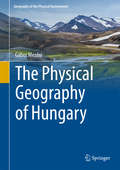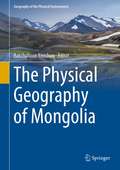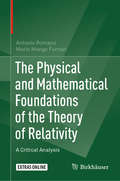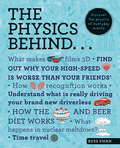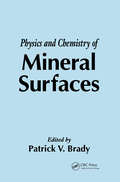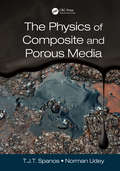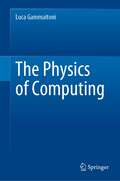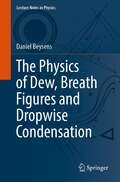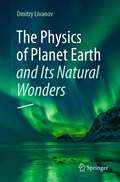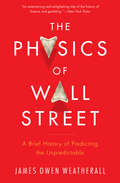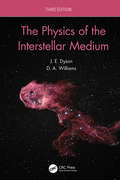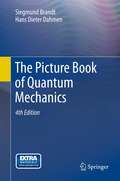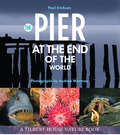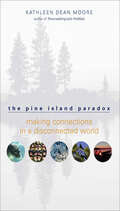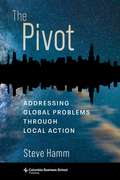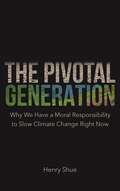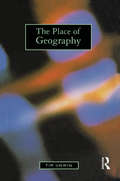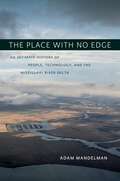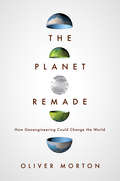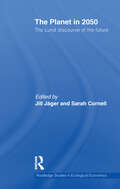- Table View
- List View
The Physical Geography of Hungary
by Gábor MezősiThis book presents the most comprehensive and detailed overview of the physical environment of Hungary. The book makes a specific effort to connect regional geography with natural forcing and influencing factors. The first section discusses general characteristics relating to the physical geography of Hungary on a more theoretical basis including relief evolution, climate, hydrography, soils and vegetation. The second part focuses on regional content and analyzes conflicts, environmental values, threats and impacts of the different geographical units. This book appeals to researchers as well as students of physical geography and related disciplines and serves as a useful source for regional information on Hungary. This book can also be used as a field guide of the physical properties of this European country.
The Physical Geography of Mongolia (Geography of the Physical Environment)
by Batchuluun YembuuThis book gives the most detailed and comprehensive physico-geographical overview of the very unique country of Mongolia. The country offers diverse geographical features and natural landscapes combined with a long history. This book offers integrated and systematical research on the geophysical characteristics of Mongolia with an academic orientation. It provides the readers with general knowledge of the physical geography of Mongolia as well as new results of the latest research. The volume consists of 11 chapters, each written by field experts, with contributions from scientific researchers from Mongolia.The topics covered: geological and geomorphological characteristics and processes, landscapes and landforms, climate and climate change, hydrology, glaciers and permafrost, soils, environmental changes, biodiversity and many other aspects of physical geography in Mongolia.The book appeals to researchers and students of geography and related fields and can serve as a guide for field trips to Mongolia or basic literature for research projects.
The Physical and Mathematical Foundations of the Theory of Relativity: A Critical Analysis
by Antonio Romano Mario Mango FurnariThis unique textbook offers a mathematically rigorous presentation of the theory of relativity, emphasizing the need for a critical analysis of the foundations of general relativity in order to best study the theory and its implications. The transitions from classical mechanics to special relativity and then to general relativity are explored in detail as well, helping readers to gain a more profound and nuanced understanding of the theory as a whole. After reviewing the fundamentals of differential geometry and classical mechanics, the text introduces special relativity, first using the physical approach proposed by Einstein and then via Minkowski’s mathematical model. The authors then address the relativistic thermodynamics of continua and electromagnetic fields in matter – topics which are normally covered only very briefly in other treatments – in the next two chapters. The text then turns to a discussion of general relativity by means of the authors’ unique critical approach, underlining the difficulty of recognizing the physical meaning of some statements, such as the physical meaning of coordinates and the derivation of physical quantities from those of space-time. Chapters in this section cover the model of space-time proposed by Schwarzschild; black holes; the Friedman equations and the different cosmological models they describe; and the Fermi-Walker derivative. Well-suited for graduate students in physics and mathematics who have a strong foundation in real analysis, classical mechanics, and general physics, this textbook is appropriate for a variety of graduate-level courses that cover topics in relativity. Additionally, it will interest physicists and other researchers who wish to further study the subtleties of these theories and understand the contemporary scholarly discussions surrounding them.
The Physics Behind... (The Behind... series)
by Russ SwanCan you really lose weight by consuming nothing but ice cream and beer? How does the latest blockbuster movie get squeezed onto a disk, and how do they make the pictures seem 3D? How much does a selfie weigh? What's the science behind forensic investigations, body scans, and the dating of ancient artefacts?The Physics Behind... takes the reader on a fascinating journey through the scientific principles that that make the modern world work. Could there be life on Mars? Why is north really south? How do self-driving cars find their way around? These and many more topics are explored by starting with the basic science that makes them tick - examining the physics behind them. Packed with detailed original artwork and infographics, The Physics Behind... is perfect for anyone who has ever been curious about the science of life.Including:- The physics behind modern life: Wi-Fi, Facial recognition, touchscreens, microwave ovens, the ice cream and beer diet, taking a selfie, Flash memory, a bag of sugar, catching the train, calendars and clocks- The physics behind entertainment: optical discs, lasers, white water, executive toys, the electric guitar, music, 3D movies- The physics behind analysis: medical imaging, looking at little things, spectroscopy, crime scene investigation, tricorder, microfluidics, radiocarbon dating, proving the Earth is round- The physics behind space: rocket science, space weather, Planet Nine, space telescopes, is there anybody out there? life on Earth, life on Mars- The physics behind big science: what's the matter?, time travel, bomb or meltdown?, the Large Hadron Collider, the Human Genome Project, the Standard Model, gravity, everything- The physics behind the weird universe: strings, rings and other things, N-dimensional space, the hypercube, antimatter, the dark universe, quantum weirdness, quantum biology, time crystals and Majorana- The physics behind the environment: weather forecasts, climate change, renewable energy, migration, peacock feathers, sunburn, rainbows, spider silk- The physics behind transportation: autonomous autos, Hyperloop, Maglev, satellite navigation, motor sport, going rreeaallllyy fast, stealth- The physics behind everything else: curve balls, the Mpemba Effect, why north is really south, perpetual motion and the heat death of the universe, and the physics behind this book.
The Physics Behind...: Discover The Physics Of Everyday Life
by Russ SwanCan you really lose weight by consuming nothing but ice cream and beer? How does the latest blockbuster movie get squeezed onto a disk, and how do they make the pictures seem 3D? How much does a selfie weigh? What's the science behind forensic investigations, body scans, and the dating of ancient artefacts?The Physics Behind... takes the reader on a fascinating journey through the scientific principles that that make the modern world work. Could there be life on Mars? Why is north really south? How do self-driving cars find their way around? These and many more topics are explored by starting with the basic science that makes them tick - examining the physics behind them. Packed with detailed original artwork and infographics, The Physics Behind... is perfect for anyone who has ever been curious about the science of life.Including:- The physics behind modern life: Wi-Fi, Facial recognition, touchscreens, microwave ovens, the ice cream and beer diet, taking a selfie, Flash memory, a bag of sugar, catching the train, calendars and clocks- The physics behind entertainment: optical discs, lasers, white water, executive toys, the electric guitar, music, 3D movies- The physics behind analysis: medical imaging, looking at little things, spectroscopy, crime scene investigation, tricorder, microfluidics, radiocarbon dating, proving the Earth is round- The physics behind space: rocket science, space weather, Planet Nine, space telescopes, is there anybody out there? life on Earth, life on Mars- The physics behind big science: what's the matter?, time travel, bomb or meltdown?, the Large Hadron Collider, the Human Genome Project, the Standard Model, gravity, everything- The physics behind the weird universe: strings, rings and other things, N-dimensional space, the hypercube, antimatter, the dark universe, quantum weirdness, quantum biology, time crystals and Majorana- The physics behind the environment: weather forecasts, climate change, renewable energy, migration, peacock feathers, sunburn, rainbows, spider silk- The physics behind transportation: autonomous autos, Hyperloop, Maglev, satellite navigation, motor sport, going rreeaallllyy fast, stealth- The physics behind everything else: curve balls, the Mpemba Effect, why north is really south, perpetual motion and the heat death of the universe, and the physics behind this book.
The Physics and Chemistry of Mineral Surfaces
by Patrick V. BradyThe last two decades have brought a near exponential increase in the amount known about mineral surfaces. Get a handle on this overwhelming mountain of information with The Physics and Chemistry of Mineral Surfaces. This much-needed text will save you hours of tedious journal searches by providing an excellent condensation and overview of the entire field, including its future direction. Top researchers outline atomistic controls on mineral surface structure and reactions; apply these concepts to explain sorption, mineral corrosion and growth; and ultimately consider the role of surfaces in environmental and geochemical processes. This unique text provides a rich and rigorous treatment of these subjects by combining surface physics and chemistry - highlighting their useful, yet often ignored, complementary nature. Unlike other texts, The Physics and Chemistry of Mineral Surfaces also stresses the linkage between fundamentals of mineral surface science and specific real-world problems. This connection facilitates the application of surface physics and chemistry to macroscopic, global processes, such as the origins of life, global warming, and environment degradation. Nowhere else will you find a text on this topic that combines expansive coverage with clear-cut practical applications. Don't miss out! The Physics and Chemistry of Mineral Surfaces has it all.
The Physics of Blown Sand and Desert Dunes
by R. A. BagnoldAn expert treatise on the origin and evolution of dunes, this classic work was used by NASA in studying sand dunes on Mars and is appropriate for undergraduate and graduate students. The first book to deal exclusively with the behavior of blown sand and related land forms, its accessible style makes it an enduring reference more than half a century after its initial publication.The author studied the sands of North Africa for many years before World War II and is recognized as a leading authority on the subject. His three-part treatment begins with his wind-tunnel experiments, which he conducted to investigate the mechanism of sand transport. First, an account of the observed movement of the individual grains, followed by a chapter on the ground wind and its dependence on the type of surface over which it blows, form a comprehensive view of the interaction between wind and sand. Part Two considers small-scale surface phenomena, such as ripples and ridges, and the closely related subject of size-grading the grains.The third part uses the foregoing results to explain the growth and movement of dunes in general, and the peculiar characteristics of the two main dune types. A method of determining the internal structure of accumulated sand illuminates both the sand's carrying power for motor transport and its water-retention potential. A final chapter, derived from firsthand knowledge, examines the intriguing subject of "singing sand."
The Physics of Composite and Porous Media
by T. J. Spanos Norman UdeyBuilding on the success of T.J.T. Spanos's previous book The Thermophysics of Porous Media, The Physics of Composite and Porous Media explains non-linear field theory that describes how physical processes occur in the earth. It describes physical processes associated with the interaction of the various phases at the macroscale (the scale at which continuum equations are established) and how these interactions give rise to additional physical processes at the megascale (the scale orders of magnitude larger at which a continuum description may once again be established). Details are also given on how experimental, numerical and theoretical work on this subject fits together. This book will be of interest to graduate students and academic researchers working on understanding the physical process in the earth, in addition to those working in the oil and hydrogeology industries.
The Physics of Computing
by Luca GammaitoniThis book presents a self-contained introduction to the physics of computing, by addressing the fundamental underlying principles that involve the act of computing, regardless of the actual machine that is used to compute. Questions like “what is the minimum energy required to perform a computation?”, “what is the ultimate computational speed that a computer can achieve?” or “how long can a memory last”, are addressed here, starting from basic physics principles. The book is intended for physicists, engineers, and computer scientists, and it is designed for self-study by researchers who want to enter the field or as the main text for a one semester course at advanced undergraduate or graduate level. The theoretical concepts presented in this book are systematically developed from the very beginning, which only requires basic knowledge in physics and mathematics.
The Physics of Dew, Breath Figures and Dropwise Condensation (Lecture Notes in Physics #994)
by Daniel BeysensIn this book, the author focuses on the physics behind dew, breaths figures, and dropwise condensation phenomena to introduce scientists, engineers and students to the many original processes involved in condensation. Consisting of 15 Chapters, 18 Appendices and over 500 references, the reader learns the needed theoretical backgrounds and formulae to understand the complexity of dropwise condensation. Heat and mass transfer, nucleation and growth on various substrates are considered (solid, liquid, plastic, undergoing phase change or micro-patterned substrates). The particular role of thermal or geometrical discontinuities where growth can be enhanced or reduced, dynamical aspects of self-diffusion, problems related to drop collection by gravity and the optics of dropwise condensation are all discussed. Although the content mainly deals with condensation from humid air, it can readily be generalized to condensation of any substance. The specificities of pure vapor condensation (e.g. steam) are also examined. Numerous images are provided within the text to illustrate the physics. This book is meant for those studying or researching dew and dropwise condensation, but also for individuals wishing to develop their knowledge on the subject.
The Physics of Ferromagnetism
by Hanmin Jin Terunobu MiyazakiThis book covers both basic physics of ferromagnetism, such as magnetic moment, exchange coupling, magnetic anisotropy, and recent progress in advanced ferromagnetic materials. Special focus is placed on NdFeB permanent magnets and the materials studied in the field of spintronics (explaining the development of tunnel magnetoresistance effect through the so-called giant magnetoresistance effect).
The Physics of Laser Plasmas and Applications - Volume 1: Physics of Laser Matter Interaction (Springer Series in Plasma Science and Technology)
by Hideaki TakabeThe series of books discusses the physics of laser and matter interaction, fluid dynamics of high-temperature and high-density compressible plasma, and kinetic phenomena and particle dynamics in laser-produced plasma. The book (Vol.1) gives the physics of intense-laser absorption in matter and/or plasma in non-relativistic and relativistic laser-intensity regime. In many cases, it is explained with clear images of physics so that an intuitive understanding of individual physics is possible for non-specialists. For intense-laser of 1013-16 W/cm2, the laser energy is mainly absorbed via collisional process, where the oscillation energy is converted to thermal energy by non-adiabatic Coulomb collision with the ions. Collisionless interactions with the collective modes in plasma are also described. The main topics are the interaction of ultra-intense laser and plasma for the intensity near and over 1018W/cm2. In such regime, relativistic dynamics become essential. A new physics appears due to the relativistic effects, such as mass correction, relativistic nonlinear force, chaos physics of particle motions, and so on. The book provides clearly the theoretical base for challenging the laser-plasma interaction physics in the wide range of power lasers. It is suitable as a textbook for upper-undergraduate and graduate students as well as for readers who want to understand the whole physics structure about what happen when an intense-laser irradiates any materials including solids, gas etc. Explaining the physics intuitively without complicated mathematics, it is also a valuable resource for engineering students and researchers as well as for self-study.
The Physics of Planet Earth and Its Natural Wonders
by Dmitry LivanovFrom earthquakes to the northern lights and tsunamis to glacier movement, the author explains thousands of phenomena in the world around us. All of this is done using language that is simple and understandable, and at the same time this book does not try to deceive the reader, as materials of this nature often do, but uses exact physical formulas where they are needed.This book serves as an invaluable reference for physics teachers and should inspire high school students to study physics. Many of them will very likely be able to understand that riveting events and phenomena lie behind those very same formulas that just yesterday seemed so boring.This is an excellent and unique way of easily submerging oneself into the world of science and a non-stop intellectual challenge that lures the reader in much more than any game of chess.Sir Andre Geim, 2010 Nobel Prize Laureate in PhysicsThere are plenty of high school students who continue to find science interesting today. Dmitry Livanov’s book, which is both useful and held in high regard, is written precisely with these young people in mind.This book can be used by teachers who want to expand the narrow scope of subject material in their classes and enable students to broaden their perspective about how to apply the laws of physics in order to understand such a complex natural object as planet Earth. This book will be of interest to high school students and graduates of high schools, specialized high schools and preparatory schools who want to test their understanding of physics, astronomy and geography. This book strengthens the foundation of scientific knowledge in today’s world, which repeatedly tests the strength of the collective body of science.Evgeniy Yamburg,Member of the Russian Academy of EducationPrincipal, School #109, Moscow Dmitry Livanov was able to write a book that is interesting both for those who are just beginning to become familiar with physics, and for those who for various reasons have forgotten much of what they knew at one time. He succeeded in doing this because he himself knows and loves physics and because physics—as the most important part of human culture—is interesting to him.I hope that readers of this book will not only recognize the usefulness and importance of physics, but also appreciate its beauty and allure.Andrey Furchenko,Doctor of Physics and Mathematics,Aide to the President of the Russian Federation
The Physics of Wall Street: A Brief History of Predicting the Unpredictable
by James Owen WeatherallA look inside the world of &“quants&” and how science can (and can&’t) predict financial markets: &“Entertaining and enlightening&” (The New York Times). After the economic meltdown of 2008, Warren Buffett famously warned, &“beware of geeks bearing formulas.&” But while many of the mathematicians and software engineers on Wall Street failed when their abstractions turned ugly in practice, a special breed of physicists has a much deeper history of revolutionizing finance. Taking us from fin-de-siècle Paris to Rat Pack–era Las Vegas, from wartime government labs to Yippie communes on the Pacific coast, James Owen Weatherall shows how physicists successfully brought their science to bear on some of the thorniest problems in economics, from options pricing to bubbles. The crisis was partly a failure of mathematical modeling. But even more, it was a failure of some very sophisticated financial institutions to think like physicists. Models—whether in science or finance—have limitations; they break down under certain conditions. And in 2008, sophisticated models fell into the hands of people who didn&’t understand their purpose, and didn&’t care. It was a catastrophic misuse of science. The solution, however, is not to give up on models; it&’s to make them better. This book reveals the people and ideas on the cusp of a new era in finance, from a geophysicist using a model designed for earthquakes to predict a massive stock market crash to a physicist-run hedge fund earning 2,478.6% over the course of the 1990s. Weatherall shows how an obscure idea from quantum theory might soon be used to create a far more accurate Consumer Price Index. The Physics of Wall Street will change how we think about our economic future. &“Fascinating history . . . Happily, the author has a gift for making complex concepts clear to lay readers.&” —Booklist
The Physics of the Dark Photon: A Primer (SpringerBriefs in Physics)
by Marco Fabbrichesi Emidio Gabrielli Gaia LanfranchiThis book is about the dark photon which is a new gauge boson whose existence has been conjectured. Due to its interaction with the ordinary, visible photon, such a particle can be experimentally detected via specific signatures. In this book, the authors review the physics of the dark photon from the theoretical and experimental point of view. They discuss the difference between the massive and the massless case, highlighting how the two phenomena arise from the same vector portal between the dark and the visible sector. A review of the cosmological and astrophysical observations is provided, together with the connection to dark matter physics. Then, a perspective on current and future experimental limits on the parameters of the massless and massive dark photon is given, as well as the related bounds on milli-charged fermions. The book is intended for graduate students and young researchers who are embarking on dark photon research, and offers them a clear and up-to-date introduction to the subject.
The Physics of the Interstellar Medium
by J.E. Dyson D.A. WilliamsThis third edition of The Physics of the Interstellar Medium continues to introduce advanced undergraduates to the fundamental processes and the wide range of disciplines needed to understand observations of the interstellar medium and its role in the Milky Way galaxy. The book is suitable for undergraduate students studying physics, astronomy, and astrophysics. The book also provides concise and straightforward discussions of interstellar physics and chemistry that are useful for more experienced readers. The book leads readers through the range of physical processes operating on both large and small scales that occur in the interstellar medium. It explores the relationship between the dusty, tenuous gas in interstellar space and the formation of stars and planets. This new edition also describes exciting developments in the field of astrochemistry and its interaction with interstellar physics, and the roles played by interstellar dust grains in interstellar physics and chemistry. Simple models in each chapter, together with problems at the end of each chapter, encompass interdisciplinary applications in atomic, molecular, solid state, and surface physics, and gas dynamics. This popular textbook provides a useful overview and grounding in the study of the interstellar medium and brings insight into many aspects of physics. Features An authoritative textbook in the field at this academic level Provides a wide introduction to the interstellar medium whilst remaining accessible and concise Revised throughout, presenting a modern understanding of the interstellar medium
The Picture Book of Quantum Mechanics
by Hans Dieter Dahmen Siegmund BrandtThe aim of this book is to explain the basic concepts and phenomena of quantum mechanics by means of visualization. Computer-generated illustrations in color are used extensively throughout the text, helping to establish the relation between quantum mechanics--wave functions, interference, atomic structure, and so forth--and classical physics--point mechanics, statistical mechanics, and wave optics. Even more important, by studying the pictures in parallel with the text, readers develop an intuition for such notoriously abstract phenomena as the tunnel effect excitation and decay of metastable states wave-packet motion within a well systems of distinguishable and indistinguishable particles free wave packets and scattering in 3 dimensions angular-momentum decomposition stationary bound states in various 3-dimensional potentials hybrid states Kepler motion of wave packets in the Coulomb field spin and magnetic resonance Illustrations from experiments in a variety of fields, including chemistry, and molecular, atomic, nuclear, and particle physics, underline the basic as well as the practical importance of quantum mechanics. In the present, fourth edition all computer graphics are presented in full color. It also contains additional physics topics such as hybridization. Praise for Previous Editions "The book is highly recommended as a complement to any standard textbook in quantum mechanics, but it will also be valuable to all of us who studied quantum mechanics without the pictures." -- International Journal of Quantum Chemistry "This book would be an excellent basis for the study of special topics in a quantum physics course. Most serious students of physics and all of their teachers will want to consider having this orderly and graphic outline of introductory quantum theory at their fingertips." -- American Journal of Physics "Their aim is the presentation of the 'principal ideas of wave mechanics' in such a way that students can build a quantum intuition out of their graphics." -- Scientific American "This is a unique book. It does not provide a complete course in quantum theory, but as a companion work of reference it should be quite useful to students in providing insights into the dynamical structure of the theory." -- Nature
The Pier at the End of the World (Tilbury House Nature Book #0)
by Paul Erickson Andrew MartinezWith lyrical writing and stunning underwater photography, this picture book follows a day in the life of the denizens lurking in the cold, tide-swept waters beneath a remote pier on the shore of a northern sea. Vivid photos of a wolf fish munching a sea urchin, a hermit crab switching shells, a sea slug arming itself with stinging cells stolen from an anemone, a 35-pound lobster guarding his domain, and other exotic creatures take us from dawn to darkness. Colorful panoramic paintings show us the bigger picture, including the eyes of nighttime predators and the creatures who are missing the following morning.
The Pine Island Paradox: Making Connections in a Disconnected World (The\world As Home Ser.)
by Kathleen Dean MooreCan the love reserved for family and friends be extended to a place? “Luminous essays” on nature and environmental stewardship (Booklist).Named one of the Top Ten Northwest Books of the Year by the OregonianIn this book, acclaimed author Kathleen Dean Moore, a winner of the Sigurd Olson Nature Writing Award for Holdfast, reflects on how deeply the environment is entrenched in the human spirit, despite the notion that nature and humans are somehow separate. Moore’s essays, deeply felt and often funny, make connections in what can appear to be a disconnected world. Written in parable form, her stories of family and friends—of wilderness excursions with her husband and children, camping trips with students, blowing up a dam, her daughter’s arrest for protesting the war in Iraq—affirm an impulse of caring that belies the abstract division of humans from nature, of the sacred from the mundane. Underlying these wonderfully engaging stories is the author’s belief in a new ecological ethic of care, one that expands the idea of community to include the environment, and embraces the land as family.“Stands with the best tradition of nature writing.” —The Oregonian
The Pivot: Addressing Global Problems Through Local Action
by Steve HammWhen the world reemerges from the COVID-19 pandemic, it seems likely that it will have transformed irrevocably. Can societies already reeling from climate change, income inequality, and structural racism change for the better? Does the shock of the pandemic offer an opportunity to pivot to a more sustainable way of life?Early in the crisis, a global volunteer collaboration called Pivot Projects was formed to rethink how the world works. Some members are experts in the sciences and the humanities; others are environmental activists or regular people who see themselves as world citizens. In The Pivot, the journalist Steve Hamm—who embedded in the enterprise from the start—explores their efforts and shows how their approach provides a model for achieving systemic change. Chronicling the group’s progress along an uncharted path, he shows how people with a variety of skills and personalities collaborate to get things done. Through their work, Hamm examines some of today’s most important technologies and concepts, such as systems thinking and modeling, complexity theory, artificial intelligence, and new thinking about resilience. The book features vivid, informal profiles of a number of the group’s members and brings to life the excitement and energy of dynamic, smart people trying to change the world.Part journal of a plague year and part call to action, The Pivot tells the remarkable story of a collaborative experiment seeking to make the world more sustainable and resilient.
The Pivotal Generation: Why We Have a Moral Responsibility to Slow Climate Change Right Now
by Henry ShueAn eminent philosopher explains why we owe it to future generations to take immediate action on global warmingClimate change is the supreme challenge of our time. Yet despite growing international recognition of the unfolding catastrophe, global carbon emissions continue to rise, hitting an all-time high in 2019. Unless humanity rapidly transitions to renewable energy, it may be too late to stop irreversible ecological damage. In The Pivotal Generation, renowned political philosopher Henry Shue makes an impassioned case for taking immediate, radical action to combat global warming.Shue grounds his argument in a rigorous philosophical analysis of climate change’s moral implications. Unlike previous generations, which didn’t fully understand the danger of burning carbon, we have the knowledge to comprehend and control rising carbon dioxide levels. And unlike future generations, we still have time to mitigate the worst effects of global warming. This generation has the power, and thus the responsibility, to save the planet. Shirking that responsibility only leaves the next generation with an even heavier burden—one they may find impossible to bear.Written in direct, accessible language, The Pivotal Generation approaches the latest scientific research with a singular moral clarity. It’s an urgently needed call to action for anyone concerned about the planet’s future.
The Place of Geography
by Tim UnwinThe Place of Geography is designed to provide a readable and yet challenging account of the emergence of gepgraphy as an academic discipline. It has three particular aims: it seeks to trace the development of geography back to its formal roots in classical antiquity; provides an interpretation of the changes that have taken place in geographical practice within the context of Jurgen Haberma's critical theory; and thirdly, describes how the increasing separation of geography into physical and human parts has been detrimental to our understanding of critical issues concerning the relationship between people and environment.
The Place with No Edge: An Intimate History of People, Technology, and the Mississippi River Delta (The\natural World Of The Gulf South Ser.)
by Adam MandelmanIn The Place with No Edge, Adam Mandelman follows three centuries of human efforts to inhabit and control the lower Mississippi River delta, the vast watery flatlands spreading across much of southern Louisiana. He finds that people’s use of technology to tame unruly nature in the region has produced interdependence with—rather than independence from—the environment. Created over millennia by deposits of silt and sand, the Mississippi River delta is one of the most dynamic landscapes in North America. From the eighteenth-century establishment of the first French fort below New Orleans to the creation of Louisiana’s Coastal Master Plan in the 2000s, people have attempted to harness and master this landscape through technology. Mandelman examines six specific interventions employed in the delta over time: levees, rice flumes, pullboats, geophysical surveys, dredgers, and petroleum cracking. He demonstrates that even as people seemed to gain control over the environment, they grew more deeply intertwined with—and vulnerable to—it. The greatest folly, Mandelman argues, is to believe that technology affords mastery. Environmental catastrophes of coastal land loss and petrochemical pollution may appear to be disconnected, but both emerged from the same fantasy of harnessing nature to technology. Similarly, the levee system’s failures and the subsequent deluge after Hurricane Katrina owe as much to centuries of human entanglement with the delta as to global warming’s rising seas and strengthening storms. The Place with No Edge advocates for a deeper understanding of humans’ relationship with nature. It provides compelling evidence that altering the environment—whether to make it habitable, profitable, or navigable —inevitably brings a response, sometimes with unanticipated consequences. Mandelman encourages a mindfulness of the ways that our inventions engage with nature and a willingness to intervene in responsible, respectful ways.
The Planet Remade
by Oliver MortonThe risks of global warming are pressing and potentially vast. The difficulty of doing without fossil fuels is daunting, possibly even insurmountable. So there is an urgent need to rethink our responses to the crisis. To meet that need, a small but increasingly influential group of scientists is exploring proposals for planned human intervention in the climate system: a stratospheric veil against the sun, the cultivation of photosynthetic plankton, fleets of unmanned ships seeding the clouds. These are the technologies of geoengineering--and as Oliver Morton argues in this visionary book, it would be as irresponsible to ignore them as it would be foolish to see them as a simple solution to the problem. The Planet Remade explores the history, politics, and cutting-edge science of geoengineering. Morton weighs both the promise and perils of these controversial strategies and puts them in the broadest possible context. The past century's changes to the planet--to the clouds and the soils, to the winds and the seas, to the great cycles of nitrogen and carbon--have been far more profound than most of us realize. Appreciating those changes clarifies not just the scale of what needs to be done about global warming, but also our relationship to nature. Climate change is not just one of the twenty-first century's defining political challenges. Morton untangles the implications of our failure to meet the challenge of climate change and reintroduces the hope that we might. He addresses the deep fear that comes with seeing humans as a force of nature, and asks what it might mean--and what it might require of us--to try and use that force for good.
The Planet in 2050: The Lund Discourse of the Future (Routledge Studies in Ecological Economics #10)
by Sarah Cornell Jill JägerIn 2050, the billions of people living on Earth have found a way to manage the planetary system effectively. Everyone has access to adequate food, shelter, and clean water. Human health is no longer considered outside of the health of the ecosystems in which people live. Ecological awareness is an integral part of education. People respond effectively to social and environmental hazards, and societies care for the most vulnerable amongst them. The economy, too, has shifted. Carbon dioxide management is under control, and energy efficiency is the norm. The remaining rainforests have been preserved. Coral reefs are recovering. Fish stocks are thriving. Is any of this really possible? How can our complex social and economic systems interact with a complex planetary system undergoing rapid change to create a future we all want? This book is a contextualised collation of ideas articulated by the 50 participants of the Planet 2050 workshop held in Lund in October 2008, as part of The Planet in 2050, an interdisciplinary Fast Track Initiative of the International Geosphere-Biosphere Programme. Participants were selected from academia and the sustainability practice community to give a wide-ranging, multi-cultural, trans-disciplinary set of perspectives. This collection explores four broad sectoral themes: energy and technologies; development, economies and culture; environment; and land use change. By doing so, this book emphasises the importance of a social dialogue on our collective future, and our responsibility to the Earth. It makes strong statements about what needs to happen to the global economy for a sustainable future and documents a new kind of scholarly discussion, engaging people from diverse knowledge communities in a spirit of exploration and reflexivity. The book provides a focus for dialogue and further study for postgraduates and researchers interested in global change as a multi-faceted, socio-environmental phenomenon, and as the book is written in an accessible scholarly style, assuming no prior specialist knowledge, it is also suitable for those involved in sustainability initiatives and policy.
